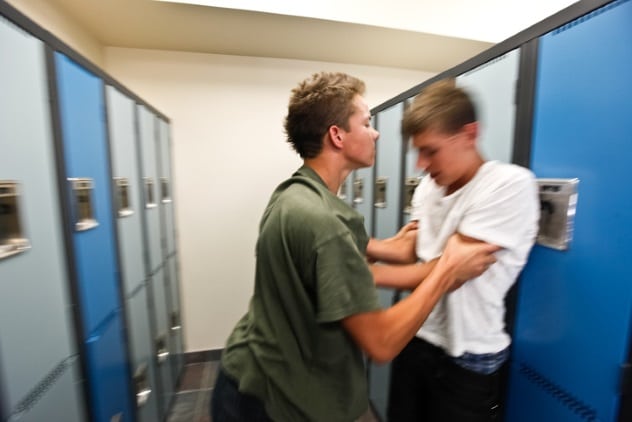 Our World
Our World  Our World
Our World  Movies and TV
Movies and TV 10 Huge Movies Almost Made by Other Directors
 Technology
Technology Lost in Transmission: 10 Unsung Heroes of Radio Innovation
 Miscellaneous
Miscellaneous 10 Incredibly Valuable Chinese Antiques Discovered by Accident
 Crime
Crime 10 Startling Cases of Jurors’ Mischief
 History
History 10 Facts about the Last Man to Be Hanged for Treason in the UK
 Movies and TV
Movies and TV 10 Actors Who Returned to Roles after a Long Absence
 Animals
Animals 10 Clever Creatures That Don’t Have a Brain
 Crime
Crime 10 Evil Pastors Who Killed Their Family
 Politics
Politics 10 Politicians Who Beat a Future President
 Our World
Our World 10 American Cities, Towns & Villages That Are Unlike Any Other
 Movies and TV
Movies and TV 10 Huge Movies Almost Made by Other Directors
 Technology
Technology Lost in Transmission: 10 Unsung Heroes of Radio Innovation
Who's Behind Listverse?

Jamie Frater
Head Editor
Jamie founded Listverse due to an insatiable desire to share fascinating, obscure, and bizarre facts. He has been a guest speaker on numerous national radio and television stations and is a five time published author.
More About Us Miscellaneous
Miscellaneous 10 Incredibly Valuable Chinese Antiques Discovered by Accident
 Crime
Crime 10 Startling Cases of Jurors’ Mischief
 History
History 10 Facts about the Last Man to Be Hanged for Treason in the UK
 Movies and TV
Movies and TV 10 Actors Who Returned to Roles after a Long Absence
 Animals
Animals 10 Clever Creatures That Don’t Have a Brain
 Crime
Crime 10 Evil Pastors Who Killed Their Family
 Politics
Politics 10 Politicians Who Beat a Future President
Top 10 Reasons School Can Be Harmful For Mental Health
Something true for almost everyone reading this is that our everyday lives as children were defined by going to school. We learned new things, manners, and how to live with other people, and we made new friends. Fun, right?
However, nowadays, high school has taken on a whole new meaning for teenage students. There are a number of reasons why high school in the United States can be quite harmful for a student’s mental health, and we will be covering ten of them in this list.
10 Bullying

Just about all of us probably knew at least one kid in school who deserved a good lesson in manners. Well, the American Society for the Positive Care of Children has found that 28 percent of all children aged 12 to 18 have suffered from bullying.[1] Bullying is a great nuisance for students, for it turns the school from a healthy learning environment to a scary no-man’s-land. If a student cannot evolve in a threat-free school, how can he learn? To make matters worse, with the rise of cyberbullying, the threat is greater than ever.
If a victim is physically bullied, he may fear for his immediate safety. Plus, alerting a teacher or adult can be scary, especially if the bully threatens to be even more cruel if an adult is involved. A young student can easily be intimidated by the class bully. And if the bully turns the school into a place associated with being beaten or getting their money or food stolen, why would a child want to go, let alone go there to learn and work?
9 Fatigue

If you walk through a high school’s hall, you’ll probably see a bunch of drowsy students with endless bags under their eyes. This can be explained by students’ answers to an online survey conducted by researchers. When asked how they felt in school, 39 percent of the students simply answered that they were tired.[2] Indeed, following classes all day is hard enough without having to wake up at 6:00 AM to catch a 6:30 bus. Add to that extracurricular activities, stress, homework, and deadlines, and you can end up tired pretty quickly.
Fatigue in students can lead to decreased performance in tests and sleeping in class (which means falling behind in the class), and it becomes a vicious circle of having to catch up at home and missing even more sleep. A healthy amount of sleep for a teenager in high school is actually 9.5 hours, but on average, they only get 7.5. Not getting enough sleep can make a teen irritable, tired, and depressed, which leads to a downfall in grades.
8 Panic Attacks

Agoraphobia can be a major cause of panic attacks, and if we take a look at schools, they are packed with seemingly endless masses of students scurrying from one class to another. Panic attacks can come from drug use or other factors, too, and two to three percent of teenagers will have a panic attack during a given year.[3]
Panic attacks can be extremely frightening, and obviously, a student who regularly experiences them cannot study efficiently. Students suffering from panic disorder are often distracted in class or carried away by their thoughts, which is why they can easily be overwhelmed if overloaded with information. Panic attacks can also be spurred by the fear of an upcoming event or overthinking something, such as a test, the consequences of a bad grade, and so on.
7 Psychiatric Disorders

High school has undeniable effects on teenagers’ mental health, and the factors are almost unending: stress, anxiety, fear, bullying, etc. It’s no wonder that more than six percent of teenagers are taking prescription psychiatric drugs.[4] These can be for anything from depression to ADHD, which can cause a student to easily get distracted and lose track of what is happening in class, making it dreadfully easy to fall behind on their notes, making it harder to prepare for tests or assignments, further digging a hole in their grades.
A student with ADHD will find it more difficult to succeed in standardized testing, for example, but also to do basic assignments and homework since they may have difficulty listening and paying attention in class. This leads to them having a lower view of their intelligence compared to other students when, in reality, it is not related to their mental capacity. Often, the problem is not related to their intelligence but rather to a lack of motivation to keep up and pay more careful attention. Instead, they decide to give up because of the difficulty they encounter while trying to concentrate.
6 Standardized Testing

Grades are scary, and school is harder than ever. How better to test students than to put them through a series of stressful tests that may or may not define their future? Well, let’s have a look at how many students aged 13 to 18 report having test anxiety: 25 percent.[5] One student out of four will freeze, sweat, or feel nausea when they find themselves in front of their blank test. It only gets worse after that because of the importance American high schools give to grades and results. If a student fails their final exams, it can have consequences for their higher education and eventually their career.
When such an emphasis is put on a test, so easy to fail if we get the answers wrong, it’s only normal to be stressed out. Standardized testing is a major academic fail for many reasons, one of which is the fact that not every brain functions the same way. Just because one student has better memory than another, it does not define his intelligence.
5 Anxiety

Students can be exposed to a great deal of worrisome situations in high school, such as deadlines, social relationships, fear of failure, and so on. The overwhelming amount of things students have to think of, remember, and hand in is simply scary. And it is not getting any better; anxiety is on the rise among teenagers.[6]
Stress makes it very difficult to work, deal with school, and have healthy social relationships, which we often forget is critical to a child’s development. In many ways, the challenges that face students in high school only make matters worse, with social relations at school being more and more difficult and many subjects requiring oral presentations. A student with anxiety will often be very distressed by the idea of presenting his work in front of the whole class. And, let’s be honest, even for those who do not already suffer from anxiety, speaking in front of a crowd is not always easy.
4 Depression

Being a teenager is hard enough without having to face difficult times at school; it can lead to a student feeling sadder and sadder for weeks or even months. Many students can feel crushed by the workload and pressure and resort to giving up, feeling the emptiness consume them. They detach themselves more and more from school, the teachers, everything, impairing their mental health and, of course, their grades.
The exhaustion often felt by teenagers at school only makes matters worse. As many as one teenager out of five experiences depression before entering adulthood.[7] In extreme cases, depression may lead to self-harm or even suicide. Financial problems can also be a cause for some cases. However, it is difficult to get an idea of exactly how many people suffer from depression, because many depressed students don’t actually seek out help or even talk about it to anyone. Depression is a recognized mental disorder, is more common than we think, and is not limited to students. If you feel depressed, talk to a specialist. Don’t stay alone.
3 Homework

Ah, homework, a mandatory exercise demanded by many teachers in high school. It is not a fun activity; more often than not, it mostly consists of exercises to train the student for upcoming tests. A survey led by the University of Phoenix reveals that high school students have to deal with an average 17.5 hours of homework per week.[8] This amount of homework may often result in late nights, stress, and fatigue, not to mention the pressure to do well, hand the assignment in on time, etc. And if students fail to hand in homework, they will get a bad grade, so they can’t allow themselves to just leave it. Everything must be done, or else . . .
Many believe homework is bad for children, simply because they need time to get some rest for their developing minds. A student who has spent the whole day at school should not go straight back to work when they get home. It’s unhealthy and very tiring for a young mind. Plus, overloading children with homework is only counterproductive because they will be working all evening and tire themselves out, leaving them fatigued the next day at school.
2 Stress

Stress in high school is very frequent. It has many occasions to manifest, and the overall pressure of “do well in school, get a good job” can be very crushing for students. And then there’s the amount of important life choices that arise during high school, such as finding a college and what a student wants to do afterward. It goes on forever and can be pretty stressful. Then come the deadlines, homework, social anxiety, grades, and more.
A research study from NYU found that 49 percent of high schoolers felt a great deal of stress on a daily basis.[9] Stress can make it very hard for a student to think straight, perform well in tests, or even function. Elite high school students are driven to aim for the most prestigious colleges, putting even more pressure on them to be successful and to get better results and grades. But stress will only make matters worse and wear them out, especially the effects of stress that will follow them throughout adulthood.
1 Social Integration

An important factor for any worker in any working space, not only students, is the feeling of belonging. Feeling out of place somewhere is very bad for a person’s well-being, and students need to feel like they are a part of the school to be happy and safe. Otherwise, it can impair their work, mental health, or both. So imagine if, on average, more than half of high school students did not feel engaged at their school. That would be catastrophic, right? Well, a Gallup poll says that only 44 percent of high school students felt engaged with their school.[10]
School is not just a place to learn about scholarly subjects; it is also a place where students learn to coexist, make friends, and cooperate with others, and if teenagers do not feel at ease in this environment, how can they learn the social skills required to live a healthy life? High school is often described as hostile for those who are not the “popular” type, and if only 44 percent of students feel at home and safe at school, then it is not the students’ faults; it is the schools’ fault.
Overall, school is home to many students with mental disorders, and they won’t be getting any better unless American high schools change their methods soon. Many countries have succeeded in having a healthy learning environment. Take, for example, Finland, which has abolished standardized testing for their students (apart from one exam at the end of senior year) and which has gotten amazing results ever since.
I am a young freelance writer willing to earn a bit of money through writing.
Read about more not-so-great aspects of public education on Top 10 Crazy Things That Crazy Schools Have Banned and 10 Ridiculous Instances Of Zero Tolerance In Schools.








